- Home
- David Lubar
Teeny Weenies: The Intergalactic Petting Zoo
Teeny Weenies: The Intergalactic Petting Zoo Read online
Begin Reading
Table of Contents
About the Author and Illustrator
Copyright Page
Thank you for buying this
Tom Doherty Associates ebook.
To receive special offers, bonus content,
and info on new releases and other great reads,
sign up for our newsletters.
Or visit us online at
us.macmillan.com/newslettersignup
For email updates on David Lubar, click here.
For email updates on Bill Mayer, click here.
The author and publisher have provided this e-book to you without Digital Rights Management software (DRM) applied so that you can enjoy reading it on your personal devices. This e-book is for your personal use only. You may not print or post this e-book, or make this e-book publicly available in any way. You may not copy, reproduce, or upload this e-book, other than to read it on one of your personal devices.
Copyright infringement is against the law. If you believe the copy of this e-book you are reading infringes on the author’s copyright, please notify the publisher at: us.macmillanusa.com/piracy.
For Leslie Blatt, who brought me there; Susan Teitelbaum, who wrangled the writers; Pam Gunter, Wayne Rush, Bruce DuBoff, and the rest of the wonderful members of the New Jersey Association of School Librarians.
Thank you for always making me feel like I’m coming home.
THE INTERGALACTIC PETTING ZOO
I would love to explore outer space, or the deepest parts of the ocean. But whenever my dad said, “Let’s explore!” all that meant was we were going to drive somewhere we hadn’t been before, looking for something to do. We would all bundle into the car—Mom, Dad, me, and my little brother and sister, Lenni and Azelia, and go off in search of fun.
Dad especially liked roadside attractions. Sometimes, that worked out okay. We’ve been to a cave about an hour and a half west of here, and to a big model-railroad display just five miles south. And there’s a nice car museum in town.
But we’ve also been to a plumbing museum, which is just about as exciting as it sounds. Imagine ten rooms filled with faucets, pipes, sinks, drains, plungers, bathtubs, and toilets. And we spent the longest two hours of my life at a natural-fiber museum. Yeah, I got to see endless types of yarn, miles of thread, and a glass tank full of hardworking silkworms.
Today, something caught my eye as Dad took a random exit off Route 80 and headed north.
There was a billboard that had an ad for Zorg’s Intergalactic Petting Zoo. I didn’t say anything. I figured, with a name like that, it would be a big disappointment. I could picture some goats with fake pairs of extra eyes glued on their foreheads, or pigs painted with purple stripes.
Unfortunately, the ad caught Dad’s eye, too.
“Look, kids!” he said. “I think we’ve found our next destination. This will be amazing!”
I wasn’t surprised by his enthusiasm. A hand-lettered sign on a piece of cardboard, nailed to a telephone pole, can catch his interest. A poorly painted sheet of plywood leaning against a rock on the ground can get him excited. But an actual professionally printed billboard towering over the roadside turns him into a total family-trip Weenie. Mom calls them tourist traps, but she’s just as big a fan of roadside attractions as Dad is.
We followed the directions on the billboard, and ended up bouncing along a small dirt road that led us to the entrance for Zorg’s Intergalactic Petting Zoo.
The building was shaped like a giant flying saucer. It was actually better built than I’d expected. A lot of these places were slapped together with plywood, and looked like they’d fall apart when the wind picked up. This one was made of metal, and looked like it was designed by someone who actually understood spaceflight. But I still didn’t get my hopes up.
We parked in the lot, then headed for the saucer, where an entrance sign with an arrow pointed to a section outlined in green lights.
A ramp came down.
We walked up.
There was a guy dressed in silver coveralls standing behind a ticket counter. He was shaped like a human, but with an enormous head. A single ear wrapped from one side of his head to the other. His nose had a pair of slits shaped like the holes in a violin. Instead of hair, he had purple scales. I hated to think what it felt like to wear that mask all day.
“Welcome. I am Zorg,” he said, in a fake alien voice.
“Five tickets, please,” Mom said. “Two adult, three children.”
We got our tickets and headed down a corridor, into the first room.
“Lambs!” Azelia squealed. She ran over to a pen that held three costumed wooly creatures behind a low fence. They were dyed blue, and had a second set of ears. The sign on the wall behind them read: Wooly Niknaks from Aldebus VII.
I figured that would be the seventh planet orbiting a star named Aldebus. I also figured there was no point being a grump, so I went along with things and petted the alien lambs. The wool felt weird, like spaghetti. Obviously, “Zorg” had sprayed something on the sheep.
“They’re so cute!” Lenni said.
Azelia wrapped her arms around a lamb. “I want to take you home!”
“They certainly are adorable,” Mom said.
“But they’re staying right here,” Dad added, before my sister could get her hopes up. He bought some “Niknak feed” from a vending machine. It looked like dried corn.
After Lenni and Azelia fed the wooly critters, we moved around the room, petting the Rigelian Squealer, which looked like a tattooed pig, the Rare Voldar IX Moo Beast, which was a calf wearing antlers, and other faked-up barnyard animals. They all felt just a bit strange.
Then, we headed down a corridor that led to a room with sea creatures. Some of them, in shallow tanks on the floor, could be petted. I expected them to be slimy, but most of them felt like flannel, or the rug in our living room.
There was a door at the other side of that room. A sign on it promised, Sol III hominids.
I’m still kicking myself for reading it without really noticing what it meant.
Anyhow, we opened the door and stepped into a room that looked pretty much like a typical kitchen.
“Sol III,” I said as the door clicked shut behind us.
Everyone looked at me. “That’s Earth,” I said. “And hominids—I think that means us.”
The floor lurched, like the whole building had jumped.
Dad grabbed the door and yanked at it.
“Locked,” he said.
“How cute!”
“Adorable!”
“I want to take one home!”
I followed the voices toward the ceiling. There was a large opening near the top of the wall. A creature that looked like an elephant with trunks for arms towered over me. I couldn’t tell for sure from below, but it was probably about ten or twelve feet tall. Two smaller versions, at seven or eight feet, stood in front of it. I guess those were the kids.
One of the kids reached down and rubbed my back with a rubbery trunk.
I was about to scream, but it actually felt kind of nice. The tip of the trunk reminded me of the scrub brush my folks keep in the shower.
Another of the kids reached into a sack and pulled out a cheeseburger. It waved it in the air, over my head. I leaped, but couldn’t quite reach it.
The parent creature tapped the kid on the shoulder, then pointed to me, as if telling the kid to stop teasing me. The kid dropped the burger into my hands.
It was pretty good.
So here we are, the Sol III hominids in Zorg’s Intergalactic Petting Zoo. It looked like Zorg wasn’t wearing a mask, after all. And the
Wooly Niknak really wasn’t a sheep. I guess it was just our luck that, out of all the fake roadside attractions and tourist traps, we had to stumble into the real thing. And to become a part of it.
Come see us sometime, if you get the chance. And don’t forget I like having my back scratched.
ROOT, ROOT, ROOT FOR THE HOME TEAM
Bentley was perfectly happy sitting on the living room floor in his pajamas, watching cartoons. But he knew his morning was about to get ruined.
“Come on, Bentley, get dressed,” his dad said. “Your sister has a game.”
“I don’t care,” Bentley said. “I want to stay here.”
“You’ll turn into a couch potato,” his dad said.
“I’m on the floor,” Bentley said.
“Then you’ll be a floor potato,” his dad said.
“That’s fine with me,” Bentley said. “I like potatoes.”
He begged and pleaded, but it was a losing battle, just like it always was. His parents insisted on dragging him out to his sister’s softball games every weekend. That wasn’t fair. Bentley had to sit in the stands and watch softball, when he could have stayed home and watched something interesting.
Well, if he couldn’t stay home, he could at least sit where he wanted.
When Bentley and his family got to the field, his sister went to join her team on the home-team bench. His parents went to the bleachers.
“What a bunch of bleacher Weenies,” Bentley muttered as he walked away from them and plunked down on the ground behind the fence that ran along the first-base line.
“Bentley,” his mom called. “Come sit with us. You’ll miss the game.”
“I can see it fine from here,” he shouted back.
Bentley expected her to argue, but she didn’t say anything more. He settled into his spot and waited for the game to begin. He was eager for it to start because the sooner it started, the sooner it would end. And then, at least, they could go for ice cream.
“Don’t forget to root,” his dad called.
“I won’t,” Bentley said.
When his sister hit a double, Bentley could hear his parents shouting, “Yay!” and “Way to go, Shana!”
Bentley waved his hands in the air and, in a voice dripping with boredom said, “Root, root, root.” That almost made him happy, because it really looked like he was rooting. He figured that would stop his parents from bothering him.
“I wish I’d thought of this sooner,” Bentley said to himself.
Every time his sister’s team scored, he waved his arms wildly and shouted “Root, root, root.”
It was the most fun he’d ever had at a softball game.
Finally, the game ended. It was time for ice cream. And then, after a double scoop of chocolate-brownie chunk or peanut-butter fudge ripple, he could go back home and watch more cartoons.
“Let’s get moving, Bentley,” his dad said, walking up to him from behind.
Bentley got up from his new favorite spot.
Or, at least he tried to.
“Come on, hurry up,” Shana said. “Everyone is waiting.”
“I’m trying.” Bentley pushed against the ground with his hands and feet. But he couldn’t get up. He felt as if his rear end had been glued to the earth.
His dad squatted next to him. “Oh, no…” he said.
“What?” Bentley asked.
“It looks like you grew roots,” his dad said.
“What!” Bentley felt under his butt on either side, with both hands.
Or he tried to. Something blocked his fingers.
“Those are definitely roots,” his mom said as she knelt on the other side of Bentley.
“Looks like you really rooted for me,” Shana said.
Bentley pushed harder. It was no use. He was firmly rooted to the ground.
“I guess we could try to dig him up,” his dad said.
“Can we get ice cream first?” Shana asked.
“Of course,” Bentley’s mom said. “He’s not going anywhere.”
“Or we could leave him here until the season is over,” Shana said. “That way, he won’t miss any games.”
“That’s not a bad idea,” Bentley’s dad said.
“It might be safer,” his mom said. “The roots are there for a reason. Come on. Let’s go before the line gets too long.”
“Hey, no, wait!” Bentley shouted as everyone walked off.
They kept going.
Bentley hoped they’d come back soon. And he hoped they’d bring him ice cream. And a shovel. As much as he liked being a couch potato, or a floor potato, being a field potato was no fun at all.
THE BULLY POOL
Gramps was visiting us for the summer. He’d grown up here in Flatsbern Hills, New Jersey, but he moved to Denver three years ago to teach art at the University of Colorado. I’d been begging him all week to take a walk to the town park. Today, we finally did.
“Is that where it happened?” I asked when we reached the fence that ran around the community pool. Kids were swimming and splashing and having a ball.
“That’s the place,” he said. “But it looks a lot different. They had to rebuild the pool. It was pretty much destroyed.”
“And you were there?” I asked.
He smiled. “I sure was. It’s a day I’ll never forget.”
I’d heard stories in school about the big disaster at the town pool, but none of my friends knew for sure what had happened. Everyone had a different version.
Gramps walked over to one of the picnic tables next to the pool. “Have a seat, Tristan. I’ll tell you all about it.”
I plopped down on the bench and sprawled out. I didn’t need to save room for Gramps. He paced when he talked. He has a lot of energy. He almost never sits.
“It was a hot July day, a lot like this one,” he said. “I was seven. We were all at the pool, because it was Founder’s Day. It was a great celebration for the whole town. The school band played. We had footraces and a pie-eating contest. There were huge platters of food spread out for everyone to enjoy. A lot of us brought sparklers to light when it got dark.”
“I’ve never heard of Founder’s Day,” I said.
“They don’t do it anymore,” Gramps said. “Not after what happened.”
I waited for him to continue.
“We ate heaping plates full of food,” Gramps said. “Back then, a lot of parents believed you’d get bad cramps if you went swimming right after eating. So we had to wait awhile. But later, we went into the pool to cool off. There was this one boy—let’s call him Howard—who wasn’t a good swimmer.”
“I’m a good swimmer,” I said. I looked at the lanes in the deep end. I could swim laps for hours without getting tired.
“I know. I made sure your folks taught you when you were real young. Howard wasn’t so lucky. When he tried to swim, he looked like a creature that had never seen a pool, or even a puddle. So the lifeguard sent him there.” Gramps pointed to the kiddie section, which had been walled off at the shallow end of the pool.
“That must have made him feel bad.” I’d hate to have to leave all my friends and wade around by myself.
“I’m sure it did,” Gramps said. “And he was there all alone. That’s how the trouble started. A kid who’s alone and unhappy is a magnet for bullies.”
Gramps stopped pacing and stared toward the kiddie pool. A cluster of little kids splashed around in water up to their chests. He seemed to be looking into the past.
After a minute, he went back to the story. “I think Dempsey Starkmonger got the idea first. He was a mean brute. Big and mean on the outside, but like most bullies, he was nothing more than a little Weenie on the inside. Still, we all stayed out of his way. When he spotted Howard, he climbed out of the pool, ran over to the kiddie section, leaped as high as he could, and yelled, ‘Cannonball!’
“He splashed down right next to Howard. The wave nearly knocked the kid off his feet.”
“And then other bullies did it?”
I asked. That’s what I’d heard.
“They sure did,” Gramps said. “One after another. And not just the bullies in the pool. It was like they were being drawn from all over town. Sort of like when sharks smell blood.”
“Poor Howard,” I said.
Gramps nodded. “Before he knew it, he was surrounded by bullies. And more kept coming. Each one did a cannonball dive. The water got more and more crowded. Soon, there was almost no room for anyone else to fit. But they still kept coming. They filled the whole kiddie pool solid. Imagine that.”
I looked at the pool, and tried to picture a solid mass of bullies.
“The last bully barely managed to cram himself into the last tiny bit of space. There was no splash now. There wasn’t any room for it.”
Gramps paced between me and the fence. “The kiddie pool was plugged tight with bully flesh, wall to wall.”
“And then what?” I asked. We were finally at the part everyone talked about. I couldn’t wait to find out the truth.
“They were stuck,” Gramps said. “Crammed so tight, none of them could get free. Like olives in an overstuffed jar. The lifeguards tried to pull them out. They couldn’t do it. They called the fire department. They couldn’t do it, either.
“Finally, the police chief, who wasn’t fond of bullies, had an idea. ‘Let them starve for a while,’ he said. ‘Then, there’ll be room to move.’”
“How long did that take?” I asked. I couldn’t imagine spending a whole day, or more, wedged against a bunch of other kids.

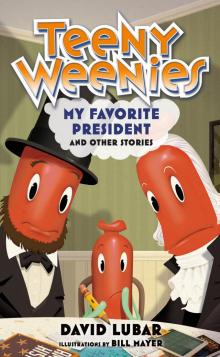 Teeny Weenies: My Favorite President
Teeny Weenies: My Favorite President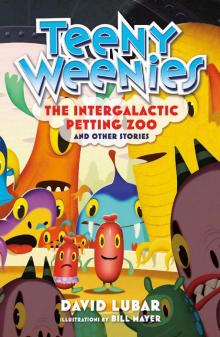 Teeny Weenies: The Intergalactic Petting Zoo
Teeny Weenies: The Intergalactic Petting Zoo Teeny Weenies: The Eighth Octopus
Teeny Weenies: The Eighth Octopus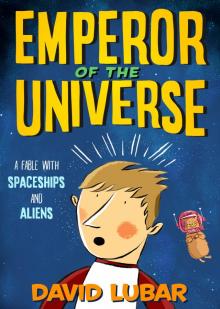 Emperor of the Universe
Emperor of the Universe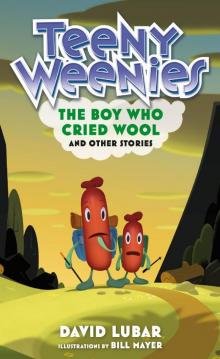 Teeny Weenies: The Boy Who Cried Wool
Teeny Weenies: The Boy Who Cried Wool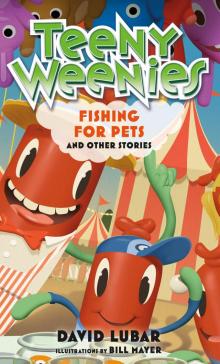 Teeny Weenies: Fishing for Pets
Teeny Weenies: Fishing for Pets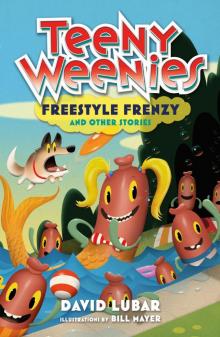 Teeny Weenies: Freestyle Frenzy
Teeny Weenies: Freestyle Frenzy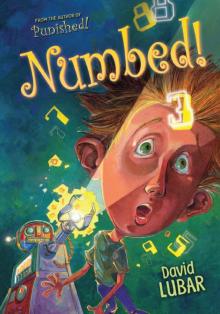 Numbed!
Numbed!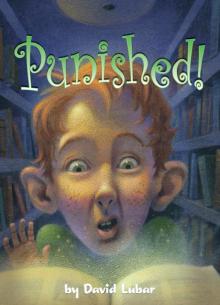 Punished!
Punished!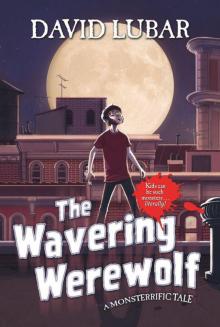 The Wavering Werewolf: A Monsterrific Tale (Monsterrific Tales)
The Wavering Werewolf: A Monsterrific Tale (Monsterrific Tales)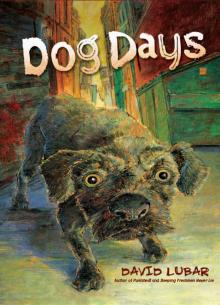 Dog Days
Dog Days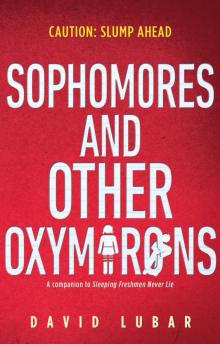 Sophomores and Other Oxymorons
Sophomores and Other Oxymorons The Psychozone
The Psychozone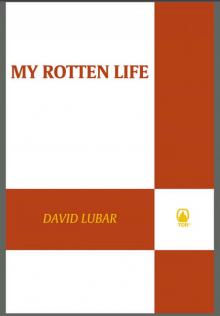 My Rotten Life
My Rotten Life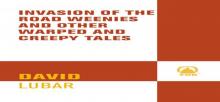 Invasion of the Road Weenies
Invasion of the Road Weenies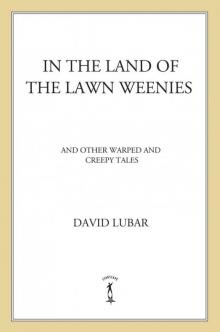 In the Land of the Lawn Weenies
In the Land of the Lawn Weenies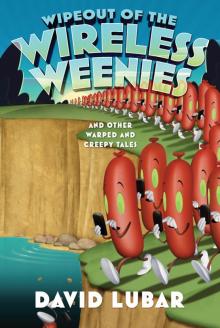 Wipeout of the Wireless Weenies
Wipeout of the Wireless Weenies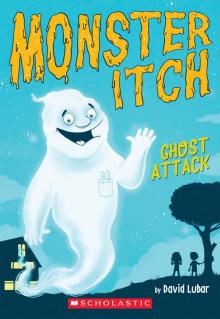 Ghost Attack
Ghost Attack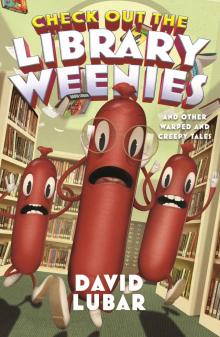 Check Out the Library Weenies
Check Out the Library Weenies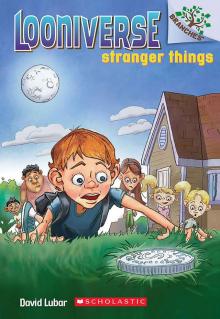 Looniverse #1: Stranger Things (A Branches Book)
Looniverse #1: Stranger Things (A Branches Book)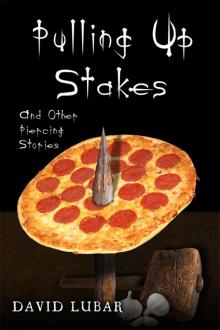 Pulling up Stakes and Other Piercing Stories
Pulling up Stakes and Other Piercing Stories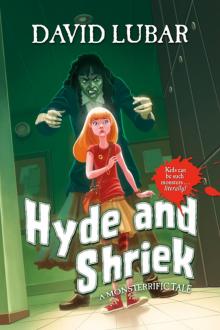 Hyde and Shriek
Hyde and Shriek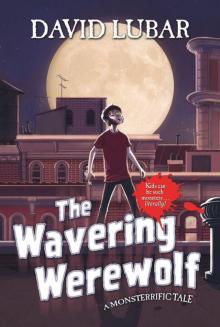 The Wavering Werewolf
The Wavering Werewolf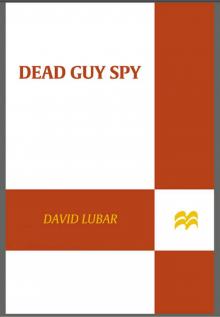 Dead Guy Spy
Dead Guy Spy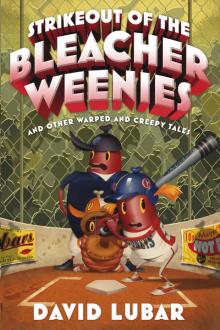 Strikeout of the Bleacher Weenies
Strikeout of the Bleacher Weenies The Big Stink
The Big Stink The Battle of the Red Hot Pepper Weenies
The Battle of the Red Hot Pepper Weenies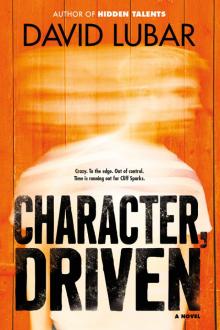 Character, Driven
Character, Driven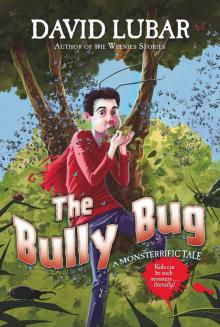 The Bully Bug
The Bully Bug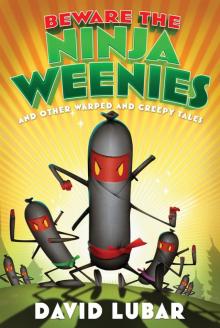 Beware the Ninja Weenies
Beware the Ninja Weenies Extremities: Stories of Death, Murder, and Revenge
Extremities: Stories of Death, Murder, and Revenge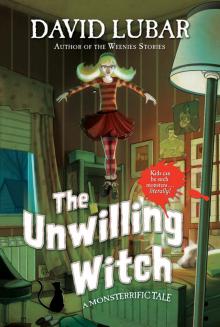 The Unwilling Witch
The Unwilling Witch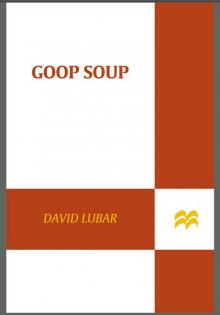 Goop Soup
Goop Soup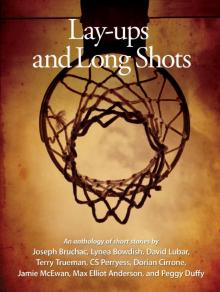 Lay-ups and Long Shots
Lay-ups and Long Shots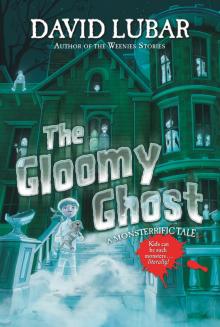 The Gloomy Ghost
The Gloomy Ghost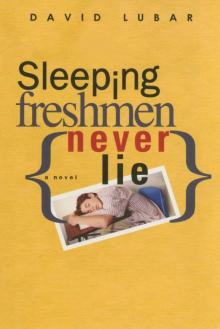 Sleeping Freshmen Never Lie
Sleeping Freshmen Never Lie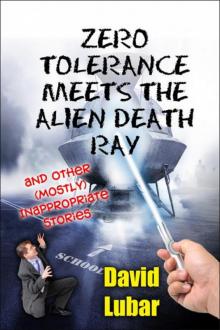 Zero Tolerance Meets the Alien Death Ray and Other (Mostly) Inappropriate Stories
Zero Tolerance Meets the Alien Death Ray and Other (Mostly) Inappropriate Stories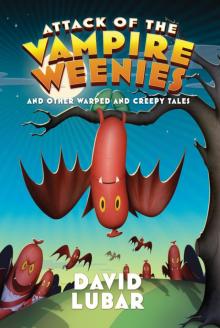 Attack of the Vampire Weenies
Attack of the Vampire Weenies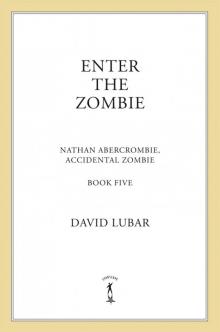 Enter the Zombie
Enter the Zombie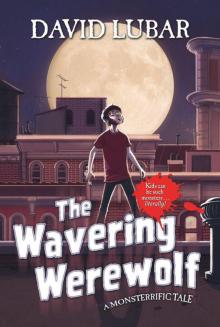 The Wavering Werewolf_A Monsterrific Tale
The Wavering Werewolf_A Monsterrific Tale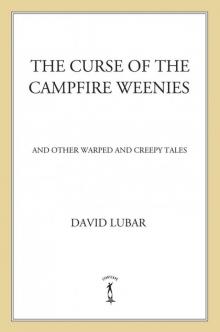 The Curse of the Campfire Weenies
The Curse of the Campfire Weenies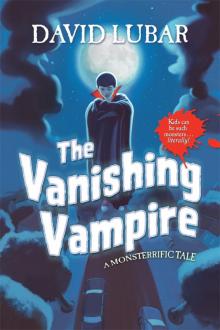 The Vanishing Vampire
The Vanishing Vampire